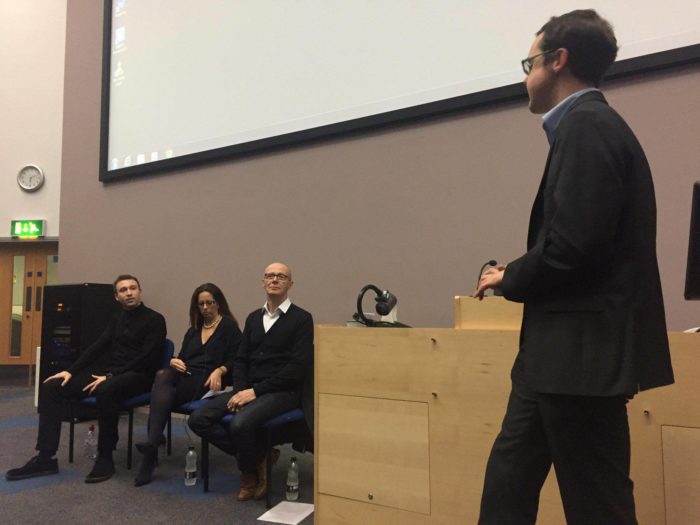Recap: The reality of investment
On Tuesday 24 October, the first Speaker event of this academic year took place at Conference Auditorium 1. Dr Alex Kevill chaired a panel discussion on the reality of investment. He was joined by three Leeds alumni; Emma Wilson-Robbins, Paul Cartmell and Max Adamski.
The event began with brief introductions from the panellists.
Max Adamski is a recent graduate of the University of Leeds and the co-founder and Creative Director of JigTalk, a new dating app. The app covers one’s face in a jigsaw puzzle and as Max describes it “is causing a disruption in the Tinders and the Bumbles”.
Emma Wilson-Robbins is a Geography alumna from the University of Leeds who decided to work in the digital media industry during the dot com boom. She started her own digital marketing agency, Harvest Digital, back in 2001 and in the last five years, due to the success of her business, she has started investing as an angel. Emma’s words of wisdom were that she’s learned more from her failures rather than her successes.
Paul Cartmell is also a graduate from the University of Leeds who started his career in Marketing and in 1991 founded his own marketing agency. After building it up for twenty years and working with major brands around the globe, he and his partner decided to sell the business. He is now an investor and a Non-Executive Director at Childs Farm; a brand creating natural, dermatologist approved toiletries for baby & child which according to Paul has been doing very well in just under four years of operation.
The discussion started with an overview on investment; how to access funding, where to look for sources of funding and the panellists’ experience thus far when it comes to either seeking investment or providing it. Max shared a snippet of advice; “August is not a great time to be asking for investment as investors are on holiday and don’t check their emails”. He also emphasised how important it is for start-ups to execute very quickly before someone replicates what they’re doing.
Emma highlighted the importance of looking at the objectives of the business before seeking investment and decide why funding is required which could range from developing technology to employing more people. Both Max and Emma agreed that there’s a balance between raising too little money and giving equity away. Emma shared that “it’s about being thoughtful about what you need and therefore who you need to target”.
Paul raised a great point about borrowing money that you may not need and being ruthless when it comes to that. He also talked about what an investor can bring to a business which may not necessarily be money but it could be experience in the industry which is also very valuable to a business.
Crowdfunding was then discussed as a way to seek investment. Emma described crowdfunding as a tool giving power to the masses and “engaging the everyday person on the street who can invest into a cool start-up”. However it’s more of a public relations activity for Emma and she suggests looking at angels and government grants before resorting to a crowdfunding campaign.
Crowdfunding is about engaging the everyday person on the street who can invest into a cool start-up.
Paul highlighted the importance of chemistry in relationships with people, mainly investors. He talked about trust and alignment of goals. Although there are a myriad schemes out there for funding, Paul advised attendees not to lose focus of the people side of things. Max added to Paul’s comments that portraying your personality is key when seeking investment. He advised against putting on a corporate front but instead being professional whilst also being yourself.
Attendees then had the opportunity to ask questions. On the resources needed when seeking investment, Max talked about a pitch deck and business plan which are both important. He also mentioned a video pitch as a great way to put a face to the brand when contacting investors through email.
On whether a prototype of the product is required when you seek investment, Emma stated that developing the product as far as can be affordable would be great. “It’s about developing your ideas as much as you can because investors want to see that it’s working and it does what it says it’s going to do”.
Be confident, be passionate and don’t be shy.
On the dos and don’ts of seeking investment, Paul highlighted his personal triad of people, product and exit with three questions respectively: "Can I get on with that person? What’s the product and what does it do? How will I get my money out in the future and exit the business?" Emma added that in the right environment, where people are there to invest money, if you are seeking investment you shouldn’t be afraid to ask for what you want. “Be confident, be passionate and don’t be shy”. She talked about rapport being important for her when it comes to capturing her attention. Max added that you need to be able to summarise your business on a tweet because you might be in a real-life situation of an elevator pitch.

